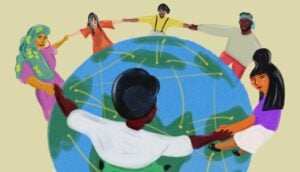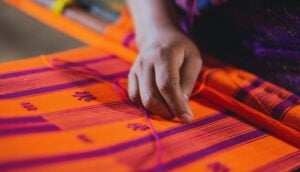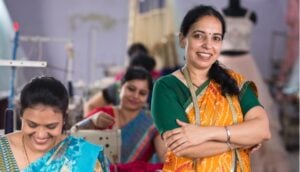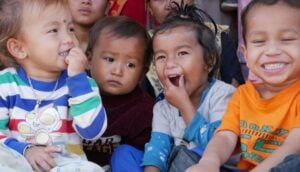Do you decide to try and reach Europe by any means necessary? So begins the Guardian’s online interactive, “The Refugee Challenge.” You play as a widowed mother of two who must escape the airstrikes in Syria and make your way to Europe, where you can attain asylum. While the victories and setbacks you encounter mimic choose-your-own-adventure novels, the detailed pictures that accompany each choice cast a long shadow over the game. The rules you must follow and the obstacles you encounter weren’t created to frustrate you, the player, but to impede real people as they seek out a better life — by any means necessary.
In the challenge, the ideal end goal is to reach Sweden. In 2013, the country announced it would grant permanent residency to Syrian asylum-seekers. This humanitarian decision was a notable first for Europe, especially in the face of what the BBC calls “the worst refugee crisis to land since World War II.” However, the fictional goal dates the interactive. As of 2015, Sweden decided to restrict permanent residency permits and immigration regulations for three years. The boom of refugees who’d successfully made their way north put a strain on government services and funds, necessitating new legislation. While the decision does not bar immigrants or refugees entirely, it might as well. Sweden was as a sanctuary, the light at the end of the tunnel. If refugees cannot rely on havens such as this, they are forced to turn to the overcrowded “limbo” of refugee camps. As of 2016, over 2.5 million Syrians had reached Turkey; however, their northern neighbor only has camps for 200,000 people. Conditions have deteriorated and many now live on the streets of major cities. Photographs of the area show shanties constructed from plastic and sheets, children begging for water, dust and dirt.
With so many people seeking refuge in the camps, it is difficult to pinpoint exactly what can be improved and where to begin. Those who run the camps and other refugee aid organizations need a tool that can locate problem areas and improve services, thereby providing a stable and conducive environment for refugees. There is perhaps no one better to determine those needs than the refugees themselves.
The Poverty Stoplight is a visual survey that helps both organizations and families. Participants who take the survey self-assess their quality of life and living conditions by marking a series of indicators — such as stable and secure housing, sufficient income, or ability to resolve conflict — as red, yellow, or green. Each color denotes the severity level of the 50 indicators; while families may choose green (showing no poverty) if they have consistent, easy access to clean water, they might choose red (showing extreme poverty) for other indicators, such as if they burn or bury their trash.
The survey is administered through an app and its illustrations ensure that even those who cannot read are able to participate. The Stoplight works because every individual’s needs are heard. The technology empowers each person, each family, to find their voice and determine their future, no matter their situation. With a simple questionnaire, they can express their dreams, desires, and necessities even within the confines of an overcrowded camp. Most importantly, they can make a plan.
The Poverty Stoplight can also be used by refugees who are able to successfully relocate to a new country permanently. These immigrants face a new set of hardships as they must learn the intricacies of their new community’s healthcare system, school system, job market, etc., all within a few months. Resettlement agencies are vital at this stage to facilitate the transition. Groups like HIAS, International Rescue Committee or World Reliefprovide essential services such as language literacy, health care navigation, or financial literacy. FSG hosted a panel last February for companies and foundations to discuss their solutions to the refugee crisis. The panel made it clear that this crisis is a complex issue:
“Understanding the full ecosystem — multiple aid providers, the needs of refugees, and a range of government policies — is critical. Together, organizations must assess and fill gaps, share knowledge, and develop partnerships.”
Organizations interested in assessing their clients’ well being, in filling those gaps, and in developing partnerships across sectors can use the Poverty Stoplight in myriad ways. Immigrants can utilize the survey to identify their strengths, needs and desires — proper identification, access to better schooling, and so on — and continue to use it until their indicators are all ‘green.’ Organizations can work with that data to measure and evaluate their efficacy over time. Eventually, they can present these performance scores to partners or other influential actors, hopefully garnering more funds and influence for future projects.
Earlier this month, Louise Arbour — a former UN high commissioner for human rights — spoke out against world leaders who have no real understanding of the refugee crisis. “Migration is here to stay,” she said, “and, in absolute numbers, it’s here to grow — and it has to be in everybody’s interest that human mobility is better managed than it is today.” Organizations can ‘better manage’ by remembering that each refugee, each migrant, already has a wealth of ideas and capabilities that they are capable of implementing. The Poverty Stoplight survey works to do just that — to make a difference, one person at a time.
If you know of an organization focused on refugee resettlement that might be interested in the Poverty Stoplight program, please have them contact us to po**************@fu****************.py
Editor’s Note:
This article first appeared on The Poverty Spotlight programme and is reproduced with permission.










